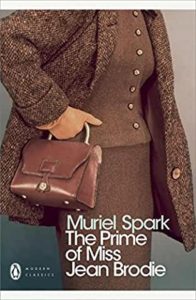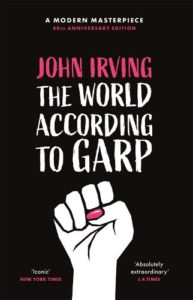Decades: Compiling the Ultimate Library with Susan Grossey
In January 2021 I first introduced the Decades Library. It’s an ongoing challenge to curate the very best collection of books, chosen by booklovers, so that any reader who selects a book from the Library will know they are reading a book someone else loved and felt was worthy of a place in the Ultimate Library.
Each week (usually) a new guest curator joins me to add new titles to the Decades Library. My guests have been authors, bloggers, publishers, journalists and podcasters but they all are asked to follow just two rules when they select the books they want to add to my Library.
1 – You Can Select ANY Five Books
2 – You Can Only Select One Book Per Decade Over Five Consecutive Decades
Easy? Well it does seem so – until you start trying to pin down five favourite books from a fifty-year publication span. There is often a great deal of rule “flexing” to be found when a curator makes their selections. This week, however, I am delighted to confirm my guest this week very much kept on the right side of the rules and when you read Susan Grossey’s bio you may understand why this is the case! Name dropping other books also crops up on a regular basis so see if you can spot the “honourable mentions”.
So without further delay I shall pass you over to Susan:
 My name is Susan Grossey, and I have made my living from crime. For nearly three decades I worked as an anti-money laundering consultant, advising banks, law firms, casinos and others on how to avoid criminal money – yes, I am almost certainly to blame when an estate agent impertinently asks you to bring in your passport and bank statement when you want to spend squillions on a new mansion. My obsession with financial crime has spilled over into my personal life, and for ten years I have been writing a series of historical financial crime novels, set in London in the 1820s and narrated by a magistrates’ constable called Sam Plank. (The 1820s was fascinating in terms of policing history – after the Bow Street Runners and before the Metropolitan Police.) I have just published the seventh and final book in the Sam Plank series: taking place in 1829, “Notes of Change” has Sam looking in inheritance fraud, gambling and murder, while considering his future in the face of the “new police” – the Met. I am now researching a new five-part series, again taking place in the irresistible 1820s, but this time in Cambridge (my home town) and narrated by university constable Gregory Hardiman. (And if, like me, you can’t get enough of Regency history, you can sign up to my monthly e-newsletter which gives a bit more detail on the research I have been doing, which may or may not make it into the books. Here’s the link: https://wordpress.us3.list-manage.com/subscribe?u=793a391cd9d51c99540eb5099&id=d302de6b99 )
My name is Susan Grossey, and I have made my living from crime. For nearly three decades I worked as an anti-money laundering consultant, advising banks, law firms, casinos and others on how to avoid criminal money – yes, I am almost certainly to blame when an estate agent impertinently asks you to bring in your passport and bank statement when you want to spend squillions on a new mansion. My obsession with financial crime has spilled over into my personal life, and for ten years I have been writing a series of historical financial crime novels, set in London in the 1820s and narrated by a magistrates’ constable called Sam Plank. (The 1820s was fascinating in terms of policing history – after the Bow Street Runners and before the Metropolitan Police.) I have just published the seventh and final book in the Sam Plank series: taking place in 1829, “Notes of Change” has Sam looking in inheritance fraud, gambling and murder, while considering his future in the face of the “new police” – the Met. I am now researching a new five-part series, again taking place in the irresistible 1820s, but this time in Cambridge (my home town) and narrated by university constable Gregory Hardiman. (And if, like me, you can’t get enough of Regency history, you can sign up to my monthly e-newsletter which gives a bit more detail on the research I have been doing, which may or may not make it into the books. Here’s the link: https://wordpress.us3.list-manage.com/subscribe?u=793a391cd9d51c99540eb5099&id=d302de6b99 )
Any my website and blog are here: https://susangrossey.wordpress.com/
DECADES
 “Scoop” by Evelyn Waugh (1938)
“Scoop” by Evelyn Waugh (1938)
My father handed me this book when I was a teenager, and as he read only two or three novels a year (contending that real life was much more exciting and interesting than made up stuff) I knew it was important. The story of hapless nature columnist William Boot being accidentally sent to cover a war in East Africa is a hoot, while cleverly skewering the nastiness of the world of newspapers (the owner of the newspaper is keen for coverage of “a very promising little war”). And some of the phrases in it – “Up to a point, Lord Copper” – have entered our family vocabulary. When I read more about Waugh, I learned that you can often love the book and dislike the author – a handy life lesson.
 “Ross Poldark” by Winston Graham (1945)
“Ross Poldark” by Winston Graham (1945)
I make no apology for including this in my library – it may not be high art, but I can think of few other books that have given me as much pleasure or that have influenced me more. I first met “Poldy” through the BBC television series broadcast in the mid-1970s and dashed to the library for the books. Imagine the glee I felt, as a fast and insatiable reader, on discovering that there were twelve books in the series. And ever since, I have loved the twin disciplines of historical accuracy and maintaining character development and story arcs across several books – my own incarnation as an author of historical series was almost certainly set by “Poldy”.
 “A Bear Called Paddington” by Michael Bond (1958)
“A Bear Called Paddington” by Michael Bond (1958)
Despite having no children of my own, I am a great reader of children’s books and still re-read favourites from my own childhood. (I wanted to include “The Little White Horse” by Elizabeth Goudge in this list, but that was published in 1946 and I’ve already had that decade…) I have chosen “A Bear Called Paddington” as it is the first Paddington book, but you could choose any one of the twenty-six Paddington books written by Michael Bond and you would not go wrong. They are beautifully written, with neat plots and vocabulary that does not talk down to children, and the central messages of acceptance, kindness and a desire to help others deserve as much publicity as they can get.
 “The Prime of Miss Jean Brodie” by Muriel Spark (1961)
“The Prime of Miss Jean Brodie” by Muriel Spark (1961)
This is a double win for me, as both the book and the film would make it into any “desert island” lists I might be invited to make. What I admire about Spark is her sparseness and hidden cruelty – you are reading along merrily and suddenly catch yourself thinking, “No! They can’t really just have said or done that!” This slim volume – telling the story of the seemingly positive but ultimately fatal influence of an Edinburgh schoolmistress over her favoured girls (“you, girls, are the crème de la crème”) – fascinates and horrifies me every time I read it. And as for Dame Maggie Smith on her bicycle in the 1969 film, well, it’s among the greatest film openings in history.
 “The World According to Garp” by John Irving (1978)
“The World According to Garp” by John Irving (1978)
This is one of those instances where I couldn’t believe my luck: an author whose book I just couldn’t put down, and who then went on to write so many more crackers. He is one of the few whose new book I will buy in hardback on day of publication because I Just Can’t Wait. Irving’s best, in my view, is “A Prayer for Owen Meany”, but that came out in 1989 (and would take me into a forbidden sixth decade.) This one is about a boy who grows up with his single feminist mother and becomes a writer and teacher – much of it is semi-autobiographical, and all of it is gripping. And as a teenager, reading the infamous car crash scene certainly put me off doing anything daring with my boyfriend in his car…
Where else but the Decades Library will you find Paddington Bear nestled beside Miss Jean Brodie? My thanks to Susan for five stellar choices. I am a big fan of Susan’s Sam Plank books and I was absolutely delighted when Susan agreed to make her Decades choices – honestly the beam on my face when I spotted Paddington in her choices!
